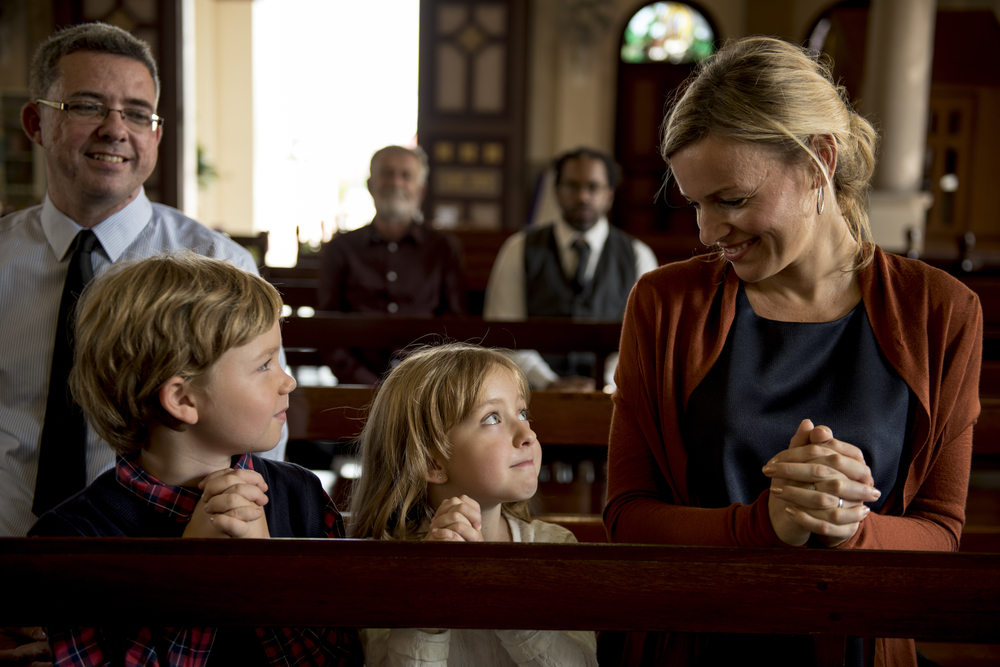“How do I get my kids to behave during Mass?” It’s a question that probably dates back to when that kid fell out of the window during Paul’s homily (Acts 20:7-12)—you just know he was goofing off!
A couple of parents in our Facebook group raised the question again and lots of you responded with advice, tips and tricks. We’ve rounded up many of them here for the benefit of a wider audience. As mom Angela Snyder quipped, “Some days we feel like a zoo in a pew.”
Some quotes from the discussion thread may have been lightly edited for length, punctuation, spelling, and so on.
Leave a little ‘wiggle room’
Before we dig into some of the strategies parents have for dealing with wiggly kids, it’s worth bringing up a point raised by several parents: Expectations for behavior need to be geared to kids’ developmental abilities.
“Depending on the age of the kid, a little bit of ‘wigglyness’ should be allowable,” says Ryan Langr.
Kristy Ellenz Voss agrees. “After taking training for Catechesis of the Good Shepherd, my standards changed. I’m more interested in my children knowing and loving Jesus than perfectly still children—forming saints, not statues. Obviously, I take my kids out if they’re disruptive, but I don’t want them to hate Mass and punish them for being kids.”
“Our expectations depend on their ages,” says Adrienne Marie. “Our 7-year-old who will be receiving his first Communion this year is expected to fully participate and pay attention. He wants to be an altar server, so we talk to him about how important that job is and encourage him to really pay attention to what they are doing. Our 5-year-old is basically expected to be quiet, stay in her seat, and we encourage her to participate. When they were younger expectations were much lower.”
Leave littles in the nursery…but take them to daily Mass
Along those lines, several commenters suggested leaving kids in the nursery, or dropping them off at Sunday school. “Ages one and two are so tough, so the nursery was helpful then,” says Allison Duffy.
One commenter labeled this option as “controversial”—presumably because many Catholic parents believe that even the littlest kids benefit from being in Mass. On the other hand, if parents aren’t able to participate in Mass because they’re wrestling wound-up toddlers, a compromise might be to leave the littles in the nursery on Sundays and then take them to daily Mass, as a number of people suggested doing.
“I started my kids out at daily Mass because it was half as long with fewer distractions,” Maggie Scheck Geene says. “It helped build up their ability to sit still and behave and to understand the flow of the liturgy. On Sundays we took advantage of day care until we thought they were able to manage.”
Bribery!
Many, many posters suggested out-and-out bribery, often with donuts…although some families have special activities as a reward for good behavior.
“I am embarrassed to say I usually end up bribing mine,” Carmen Gallegos says. “We get a small treat after. Oh my gosh, it works!”
Stephanie Finley adds a twist to the incentive: “Even if I think they weren’t on their A game at Mass, if anyone around them comments positively on their behavior, that trumps mama or dad’s opinion and earns an automatic treat at home.”
Make Sundays really special
Along those lines, Kendall Verrett Shaw suggests making Sundays special “and very different from the rest of the week.”
Her family’s Sundays include Mass, “feasting” with donuts and desserts, a big family dinner, lots of family fun time, minimal chores, and so on.
“The children really look forward to Sundays now and they know Mass is at the heart of that,” she says. “We do try to wear our ‘Sunday Best’ to Mass and I think that helps, too. I credit Leila Lawler’s excellent blog, Like Mother, Like Daughter, for this inspiration!”
Model, Prepare, Preview, Explain
Numerous parents suggested preparing kids for what to expect at Mass, modeling appropriate behavior, explaining what’s going on, and sitting up front where kids have a good view of the action.
“I try to engage them with what’s going on during Mass by explaining it and being excited,” says Christy Johnson. “For example (whispering): ‘Look at the priest holding the Eucharist. What do you think that is for?’ I have them help me find the numbers for the ‘prayer songs,’ and before mass I remind them that God’s going to talk to them and afterwards I ask what God said to them. Sometimes, I’ll have them see how many crosses they can find.”
Preview the readings with your older kids, a practice Natalie Elskamp recommends: “Read the Sunday Mass readings at breakfast and talk about what sticks out to you and have them listen for certain things and discuss after. If you run out of time to read the Mass readings, play a game in the car and try to guess where the readings will be taking from.”
Previewing the readings during Saturday evening family prayer also works well.
Get kids actively involved!
Leslie Boria Carter must go to an amazing parish, based on her description: “Our kids are actively involved…. We have a fantastic educational and music director who has the kids do a gospel re-enactment every Sunday during the family Mass. As soon as my kids were able, all three wanted to be part of it. Now my 13-year-old daughter helps guide the little re-enactors in and out of the pews and works to set out props. My son,14 years old, continues to altar serve, and my youngest daughter (9 years) altar serves and sings in our choir. Both older kids also volunteer every summer with our VBS since they aged out. We are always looking for ways to be part of the community! I tell my kids one of my favorite things is being surrounded by my family at church!”
Is it wrong that we envy you, Leslie Boria Carter? But there are probably ways that families can adapt some of these activities to their own parish situation—for example, by having kids re-enact the readings at home.
Bring a religious activity
Mints, suckers, the ever-popular Cheerios, along with coloring books and stuffed animals, all made some parents’ list. Other parents go for more religious ways of keeping kids busy.
“Our church had ‘Mass bags’ with religiously themed coloring books, stories, etc.,” writes Ryan Langr. “Most churches provide something like this.”
“We don’t bring any toys, but do allow a notebook and pen,” says Alison Duffy. “Toys and snacks caused fighting. Even coloring books caused fighting over crayons.”
“We do not bring ‘stuff’ (food, books, toys) with us,” agrees Marie Stamm. “It was just too much of a problem. Once in a while, our older two will bring a rosary or prayer card, and our daughter has recently been bringing a kids’ missal she got at school.”
The subscription kids’ missal, Magnifikid (by the same people who produce Magnificat) is recommended for some parents. Joanna Dell has found that helpful for her son. “It has helped him to follow along with the Mass,” she says. “We also sit in the front row where he can see. When he was younger we had a bag of Catholic picture books about Mass, angels, and saints that he was only allowed to look at in church.”
Check out OSV Catholic Bookstore for a variety of children’s books that are appropriate for Mass.
Consequences after Mass
A number of parents recommended consequences of one type or another—from treats after Mass to negative consequences for misbehavior.
“We reinforce good behavior with surprise treats,” says Natalie Elskamp, adding that she’s sure to mention what fun things her kids are missing out on if they misbehaved at Mass. “When they are really naughty and disruptive, I keep track of how many times I have to reprimand them in Mass and then they have to sit/stand/kneel at home (whatever they didn’t do in Mass) a certain amount of minutes per infraction. We haven’t had to do this in two years because it works so well. They know if they will have to behave one place or another so might as well just do it once.”
Go to Mass Twice
“Our rule is we go two times in one weekend if we can’t quietly make it through one!” writes Chelsea Lehnertz.
You might think she’d be alone, but Stephanie Finley would go there, too: “We’ve only had to do this once, and I consider it a sort of ‘nuclear option,’ but if it’s . . . crossing the line well into bratty disobedience—the “know better but don’t care, what are you going to do about it” kind—we have said, ‘I know you can do better. Your behavior was terrible. It was a distraction to me, and to people around us. So, we are going home to eat an early lunch and then we are coming back for the 12 o’clock Mass, so that you and I have a second chance to participate.’”
Love and positive reinforcement
Laura Morales puts a lot of her energy into positive reinforcement. “I love my children and love to have them with me at Mass,” she says. “I try to make it as positive an experience for them as I feel it is for me. I thank them for coming, tell them how happy it makes me to be able to bring them to God, as he gifted me with them. I hold hands with them, smile, give positive touches. I open the missals and read along with them, point out the bells and remind them of the miracle. I do sometimes also need to say no, but focusing on the bad behavior makes it seem more like a chore to get through. God wants us to bring our children, he loves them as they are.”
What a beautiful reminder!
Try Catechesis of the Good Shepherd
A good handful of parents mentioned how helpful they found Catechesis of the Good Shepherd.
Kristy Ellenz Voss explains it this way: “It’s a Montessori program that follows the liturgical cycle; kids learn all about the prayers, gestures, and all the articles used in the Mass using developmentally appropriate materials.”
Develop a relationship with your priest
“Also, have a relationship with your priest,” adds Natalie Elskamp. “Have your kids get to know him. Have him over for dinner, games, campfires, etc. Because if they know him, not only do they like seeing him, but he can also reinforce good behavior or call out bad behavior, and having another person on your side is so helpful.”
Persistence pays off
And above all, veteran parents say that it’s often just a matter of persistence.
“We just keep going back,” says Angela Snyder. “Depending on the age of your kids, repetition and learning how to behave takes practice.”
“Just seeing you on your knees in prayer in the pew is so important,” says Stephanie Finley. “Hang in there!”
“The more you go, the better they will get,” Mia Vasquez says. “And give yourself some grace. You made it to church.”
And someday, when your kids are all grown up and you’re sitting behind a small pack of really wriggly kids, don’t forget to lean over and give those beleaguered parents a few words of encouragement!



